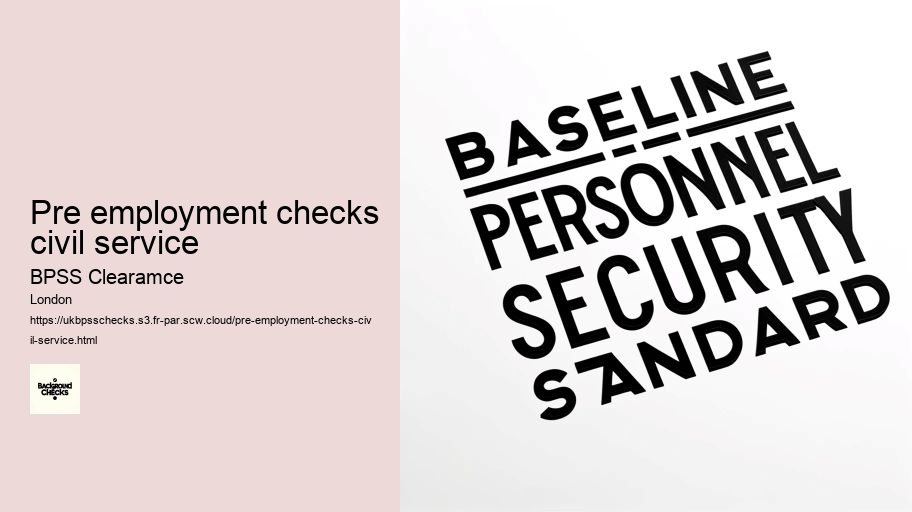
Compliance with BPSS checks is not only about adhering to legal requirements but also about ensuring the safety and security of governmental operations and sensitive information. Organizations that fail to properly conduct these checks risk breaches of security, financial penalties, and damage to reputation. Hence, BPSS checks are an essential aspect of security practices for entities associated with the UK government.
The verification of essential documents plays a pivotal role in the recruitment process requirements for obtaining BPSS clearance. To guarantee a thorough evaluation of candidates, organizations typically follow these steps:Applicants need to provide documents like a passport or driver's license to confirm their identity.
Providing evidence of volunteering activities or caring responsibilities could form part of the supplementary checks during BPSS clearance. Additionally, documentation related to career gaps, redundancy, or periods of unemployment may be requested to ensure a thorough review of the individual's background.
To verify your employment history for BPSS clearance, make sure you have documentation such as PAYE records, HMRC tax records, payslips, P45, and P60.
The process of obtaining BPSS clearance includes a detailed review of the applicant's identity documents, such as passports or driver's licenses. This step is vital to confirm that the individual is who they claim to be, which is fundamental in preventing identity fraud within high-security environments. Proper identification is the cornerstone of the BPSS clearance process and helps maintain the integrity of the workforce within protected sectors.
However, for positions where exposure to SECRET and TOP SECRET information is probable, BPSS stands out as a fundamental baseline standard ensuring the trustworthiness and eligibility of individuals in sensitive roles.

Maintain your BPSS clearance by understanding the validity period and renewal requirements.
Under the Immigration, Asylum, and Nationality Act 2006, employers are required to perform right to work checks to confirm an individual's eligibility to work in the UK. BPSS clearance incorporates these checks, aligning with legal requirements to prevent illegal working and ensuring that all employees have the necessary authorization to work.
4. **Confirm Employment History:** Validate the accuracy of the individual's employment history to ensure transparency and honesty.
BPSS clearance procedures also adhere to UK employment laws to ensure that the vetting process is non-discriminatory and respects the rights of individuals. Employers must ensure that their BPSS processes comply with the Equality Act 2010, avoiding any form of discrimination based on protected characteristics during the vetting process.
BPSS checks involve several key components: identity verification, employment history check, criminal record check, and nationality and immigration status check. Each of these areas is carefully examined to ensure that the individual does not pose a security risk.
Reviewing a candidate’s employment history is another vital component of the BPSS checks. This involves verifying previous employment details, gaps in employment, and reasons for leaving previous positions. The aim is to confirm the candidate's work history and to identify any inconsistencies that might suggest security risks.


Digital technology also enhances the accuracy of the BPSS checks by reducing human error. Automated systems can cross-reference and validate information against multiple databases in real-time, ensuring that discrepancies are quickly identified and addressed. This leads to a more reliable vetting process and increases the security and trustworthiness of personnel.
Baseline Personnel Security Standard (BPSS) checks are a fundamental pre-employment screening process in the United Kingdom, primarily designed for individuals who will be working in the government or with government contractors. These checks serve as a first line of defense, ensuring that individuals employed in positions of trust are properly vetted to safeguard national security and the integrity of public services.
If you're a non-UK national, make sure you provide proof of residency along with other required documentation. Additionally, be prepared to submit detailed employment history records like payslips and tax documents to validate at least three years of work experience.
The integration of digital technologies has streamlined the BPSS clearance process, making it more efficient and less prone to errors. Digital solutions allow for the rapid processing of checks and secure storage of sensitive data, enhancing the overall security and efficiency of the vetting process.
Generally, a BPSS check can take anywhere from two weeks to a month to complete. This timeframe assumes that there are no complications, such as discrepancies in the information provided or delays in receiving necessary documents from third parties.
Several factors can influence the duration of a BPSS check. These include the accuracy of the information provided by the applicant, the speed with which previous employers respond to verification requests, and the specific requirements of the employing organization.

Social workers dealing with sensitive cases, such as child protection or mental health issues, need BPSS clearance to ensure they handle such vulnerable information with the utmost integrity and confidentiality.
2.
BPSS checks are generally conducted as a one-time check prior to employment to establish a baseline of trust and security clearance. However, depending on the nature of the work and the level of security required, BPSS checks might be revisited if a person's role or security clearance level changes.
BPSS stands for "Baseline Personnel Security Standard." It's essentially a basic level of security clearance required for individuals working in roles that involve access to sensitive information or facilities, especially in the public sector. The BPSS checks typically include identity verification, employment history checks, and criminal record checks.
No, BPSS (Baseline Personnel Security Standard) and DBS (Disclosure and Barring Service) are not the same.
BPSS (Baseline Personnel Security Standard): This is a set of government guidelines in the United Kingdom for ensuring the security clearance of individuals working with sensitive information or in certain roles. It is a basic level of security clearance and involves checks such as identity verification, employment history, and criminal record checks. BPSS is often required for roles in both the public and private sectors where access to sensitive information or facilities is involved.
DBS (Disclosure and Barring Service): This is a government agency in the UK that performs checks on individuals working with children or vulnerable adults. The DBS conducts criminal record checks (previously known as CRB checks) to help organizations make safer recruitment decisions by identifying candidates who may be unsuitable for certain roles due to past criminal convictions, cautions, reprimands, or warnings.
While both BPSS and DBS involve background checks, they serve different purposes and are used in different contexts. BPSS focuses on security clearance for a broader range of roles, including those involving access to sensitive information, while DBS specifically focuses on roles involving work with vulnerable groups.
The Baseline Personnel Security Standard (BPSS) checks typically include:
Identity Verification: Verifying the identity of the individual through official documents such as passports, driver's licenses, or other government-issued identification.
Employment History Checks: Verifying the individual's employment history to ensure accuracy and assess their suitability for the role.
Criminal Record Checks: Checking for any criminal convictions or cautions. This is often done through a Basic Disclosure from the Disclosure and Barring Service (DBS) in England and Wales, Disclosure Scotland in Scotland, or AccessNI in Northern Ireland.
Verification of Address: Verifying the individual's current and previous addresses to ensure accuracy and completeness of their background information.
These checks are aimed at establishing a baseline level of trustworthiness and suitability for individuals working in roles that require access to sensitive information or facilities, particularly within the public sector but also in some private sector positions.
A valid proof of address for a Baseline Personnel Security Standard (BPSS) check typically includes official documents that clearly display the individual's name and current address. Common examples of acceptable proof of address documents may include:
Utility Bills: Recent bills for services such as electricity, gas, water, or landline phone, issued within the last three to six months.
Bank Statements: Recent bank statements, typically issued within the last three to six months, showing the individual's name and address.
Official Letters: Letters from government agencies, local authorities, or financial institutions, such as tax statements, council tax bills, or letters from the Department for Work and Pensions (DWP), which display the individual's name and address.
Tenancy Agreements: A signed and dated rental or lease agreement for accommodation, showing both the tenant's and landlord's details, along with the property address.
Mortgage Statements: Statements from a mortgage provider showing the individual's name and property address, issued within the last three to six months.
It's important to note that the specific requirements for proof of address may vary depending on the organization conducting the BPSS check. Additionally, the document should be recent and not expired, and it should clearly display both the individual's name and current address.
A Baseline Personnel Security Standard (BPSS) check is typically required for individuals working in roles that involve access to sensitive information or facilities, particularly within the public sector but also in some private sector positions. While specific requirements may vary depending on the organization and the nature of the role, BPSS checks are commonly needed for individuals who:
In summary, individuals who require a BPSS check are those whose roles involve a level of trust, responsibility, and access to information or facilities that necessitate verification of their identity, employment history, and suitability for the position.
The Baseline Personnel Security Standard (BPSS) does not have an expiry date like some other security clearances. Instead, it serves as a foundational level of security clearance that establishes an individual's baseline trustworthiness and suitability for roles requiring access to sensitive information or facilities.
However, while the BPSS itself does not expire, organizations may have their own policies regarding the periodic review or renewal of security clearances for their employees. For instance, some employers may require employees to undergo regular rechecks or refreshes of their background checks, including BPSS checks, to ensure that their security clearance remains up to date.
Therefore, although the BPSS clearance itself doesn't have a fixed duration, individuals and organizations should be aware of any policies or requirements related to maintaining and updating security clearances in accordance with best practices and organizational guidelines.